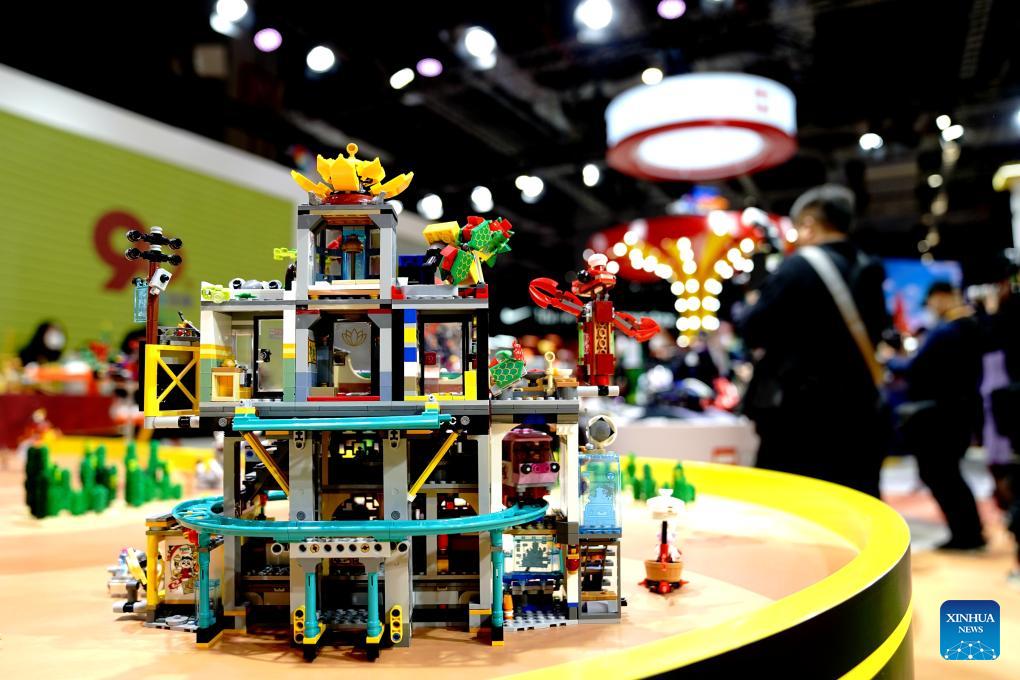
 0 Comment(s)
0 Comment(s) Print
Print E-mail Xinhua, December 29, 2023
E-mail Xinhua, December 29, 2023

This photo taken on Nov. 5, 2022 shows the exhibits of LEGO Group at the consumer goods exhibition area of the fifth China International Import Expo (CIIE) in Shanghai, east China. [Photo/Xinhua]
As China vigorously promotes consumption and optimizes the foreign investment environment, overseas brands are continuing to explore the consumption markets in west China by launching innovative business formats and opening new stores.
The LEGO Group on Saturday opened its second beacon store in China in Xi'an, capital city of the northwestern Shaanxi Province, after the opening of its first such store in the central Chinese city of Changsha in August.
According to the group, the opening of this new beacon store is not only an important step in further expanding its presence in the Chinese market, but also a testament to the confidence placed in the important role of key cities in western China.
Since entering China in 1983, especially after the establishment of the brand's retail network in 2016, LEGO has continued to focus on the development of consumer markets in the central and western Chinese regions. It has so far opened 19 stores in Shaanxi.
Jenny Xu, vice president of LEGO China Offline Branded Retail, said that over the past few years, in addition to the launch of new stores, the company has dedicated efforts to achieve innovation in the retail business formats.
"The beacon store in the ancient capital of Xi'an features historical and cultural elements and offers consumers interactive experiences. I hope this new business format will become a way for people to enjoy traditional Chinese culture and for tourists to explore more insights related to Xi'an," Xu said.
"The store is like an amusement park," said Chen Qingtan, a junior middle school student from Xi'an. "It integrates with the historical and cultural characteristics of Xi'an to offer customers a more 'Chinese style' immersive experience."
Since 2018, LEGO has participated in the China International Import Expo for six consecutive years and continued to increase investments in China, especially in inland regions. According to Paul Huang, senior vice president of LEGO Group and general manager of LEGO China, the company's plan to expand its market in China stems from its strong confidence in the country's development.
Since the beginning of this year, China has consistently implemented policies to enhance the foreign investment environment and increased efforts to attract foreign investment, which demonstrate the country's unwavering commitment to further opening up, Huang said.
Apart from LEGO, numerous other foreign businesses are expressing confidence in the consumer market in western China.
In November this year, the Livat Xi'an commercial complex was officially completed and is currently undergoing decoration. As the largest wholly foreign-owned commercial project in Shaanxi, Livat, with a total investment of 4.3 billion yuan (about 606 million U.S. dollars) and a construction area of more than 320,000 square meters, can accommodate more than 450 domestic and foreign tenants.
Located at the Xi'an International Trade and Logistics Park, the Xi'an terminal project, a railway logistics investment project from Kazakhstan, with a total area of about eight hectares, recently commenced operations, marking the initial establishment of Kazakhstan's business logistics distribution center in China.
"Investing in China is investing in the future, and many overseas brands have cast a vote of confidence in the Chinese economy in the inland markets," said Wu Gang, a researcher at the institute of economics of the Shaanxi Academy of Social Sciences.
"As China continues to optimize the business environment, protect the rights and interest of foreign investments, and strengthen the protection of intellectual property rights, the consumer market potential in central and western Chinese cities will continue to be unleashed," Wu said.
According to data from the Shaanxi provincial department of commerce, in the first three quarters of this year, the actual use of foreign capital in Shaanxi reached 1.12 billion U.S. dollars, up 6.5 percent year on year.
The number of newly established foreign-invested enterprises was 273, up 21.9 percent year on year. Among them, the foreign capital from Europe was 323 million U.S. dollars, an increase of 78.2 percent, accounting for 28.9 percent of the total actual use of foreign capital in the province.